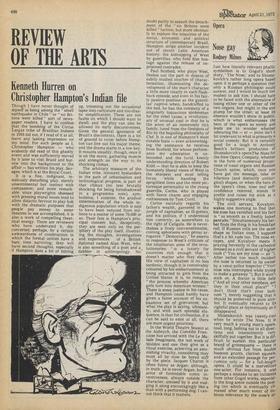Opera
Nose gay
Rodney Eines
Just how literally relevant phallic symbolism is to Gogol's short story, 'The Nose,' and to Shostakovich's rather long opera based upon it is perhaps a question that only a Russian philologist could answer, and I would be much too modest to ask him. I should hate to be faced with the alternative of losing either one or other of the two organs, but might in the end plump for the other; at least its absence wouldn't show in public, which is what embarrasses the hero of the opera so sorely and leads me to wonder whether labouring the — er — point isn't a bit irrelevant to what is primarily a. social comedy. But it is certainlY good for a laugh in AnthonY Besch's brilliant production of Shostakovich's opera The Nose for the New Opera Company, whether in the form of numerous projections of nasal organs and Russian Church spires, which, once you have got the message, take on hilarious (and distinctly unliturgical) shapes, or when the hero at the opera's close, nose and selfconfidence restored, stands in profile and raises his stick at a highly suggestive angle.
The civil servant, Kovalyov. wakes one morning to find that his nose has vanished and his face is "as smooth as a freshly baked pancake." Simultaneously his barber finds the thing in his breakfast roll. If Russian rolls are the same shape as Italian ones, I suppose that's a bit rude too. The nose escapes, and Kovalyov meets it praying fervently in the cathedral dressed as a civil servant of higher rank (" You are my nose — sir ''). After rather too much incident the nose is returned to its owner by a venal police inspector ("Your' nose was intercepted while trying to make a getaway "). But it won't stick on. A doctor is little help ("And all your other members, are they in their usual place?" ".1 don't think that's your business "), merely suggesting that it should be preserved in pure alcohol. It eventually returns to its rightful place as mysteriously as it disappeared. Shostakovich was twenty-two when he wrote The Nose. It is very much a young man's opera. loud, long, lashing out in all directions and intermittently verY skilfully put together. But it is dif' ficult to sustain this particular brand of grotesquerie — there is much obvious fun from double bassoon grunts, clarinet squeals, and an extended passage for per . cussion only — for a full-length opera. It could be a marvellous one-acter. For instance, it was perhaps a mistake to set incidents from other Gogol works, especially the long scene outside the posting inn which is eventually climaxed after much event of dubious relevance by the nose's at' ator April 21, 1973 teMpted getaway. On the whole it is the original scenes that work hest: the barber's furtive attempts to ditch the nose, the angry correVondence with Mme. Podtchina (which naturally turns into a vocal quartet) and the episode in the newspaper office. This last Contains one of the few welcome Tile men ts of lyricism, a beautiful dna accompanied by strings only la which Kovalyov tries to explain hiS predicament to an unsympathetic and sceptical audience. But the three scenes for nose-hunting citizens which run on without musical break are very well managed. and much of the piece is hysterica Ily funny, certainly in Ed,ward Downes's deadpan translation, most of which (thanks to careful conducting by Leon Lovett) was audible.
Mr Besch's production was taut arid inventive. It was maybe a little too inventive in the orchestral interludes of the episodic first
arid second acts, where most of ,tt.le Projections came. As men`Ibned, many of these were diverting to a degree, and they di verted right away from the music. Cognoscenti said the interlude Music was poor anyway, but I would have welcomed the opportu,oity of finding that out for myself. The trumpet solo that was accompanied by a projected strip cartoon showing he nose's adventures in St Petersburg sounded Pretty rich. Peter Rice's sets were Fheerful and colourful. I imagine It would be possible to perform the Work in much more sombre, abstract decor, and it might turn out to be far more disturbing. As it Was, many members of the audience were unconsciously feeling their noses in the interval. The enormous cast (thirty-five named roles) rose to the occasion suPerbly. Alan Opie's Kovalyov was a virtuosd. performance vocr,allY and dramatically, Bernard uickerson's errant organ was furtive and supercilious by turn, and John Winfleld's Inspector penetrated the further reaches of the etior register (top D's and E's) with --.1 comically unconstabular effect. (It is this satirical treatment the forces of law that has caused The Nose's absence from the Russian stage since the 20s, though it is popular in East Gerd to.y). Alexander Oliver dealt "eitlY with a number of small Farts. New Opera Company perormances are in a sense try-outs for Sadler's Wells Opera; while not urging this one on the Coli seum many of its finer points Would be lost there — it does seem L
great pity to have to wait a year before hearing it again.



































 Previous page
Previous page